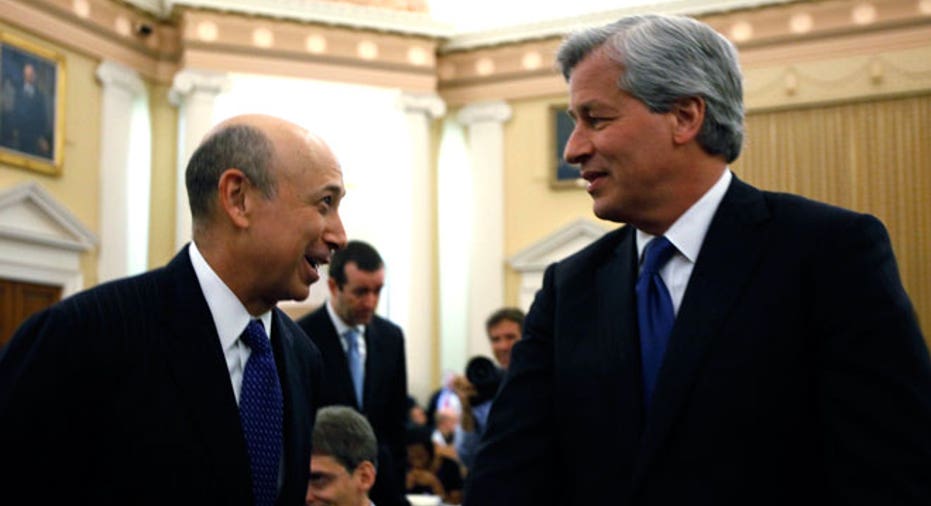CEOs Willing to Forgive In Exchange for Specifics

Most CEOs would happily forget the name calling and demonization of big business at the hands of the White House over the past several years in exchange for a concrete fiscal policy the company executives could plan around going forward.
But if history is any indication, that’s not likely to happen.
President Obama and his representatives are meeting nearly every day with different business groups apparently seeking to persuade them that approving tax increases on the wealthiest Americans is the clearest path toward avoiding the ‘fiscal cliff’ in the short-term and achieving a balanced budget in the long-term.
An interesting question -- especially with regard to a meeting scheduled for Wednesday which included the likes of Goldman Sachs (NYSE:GS) CEO Lloyd Blankfein -- is whether the two sides are willing to mend fences enough to hear one another out.
After backing Obama in 2008, vast swaths of the business community, tired of being labeled “fat cats” and fearful of higher taxes and additional layers of costly regulations, turned on the president during the election cycle just ended, supporting instead Republican challenger Mitt Romney.
Now, despite some potential awkwardness, the two sides must reach rapprochement if the president hopes to find backing from this important sector just weeks ahead of the Jan. 1 fiscal cliff deadline.
If no budget deficit deal is reached by then between the president and Republican Congressional leaders the U.S. faces $607 billion in tax increases and mandated across-the-board spending cuts, conditions that would likely push the U.S. back into recession.
CEOs Not Seeking an Olive Branch
Most corporate executives aren’t seeking an olive branch from the president, however. What they want is specific and politically realistic proposals that would put an end to years of uncertainty tied to corporate taxes, health-care costs and the ever-changing regulatory environment.
Bill O’Grady, chief investment strategist at Confluence Investment Management in St. Louis, said business leaders are “exactly who the president should be talking to.”
And he explained why. At last count U.S. companies were sitting on cash reserves estimated at $1.5 trillion, apparently reluctant to invest the money because of all that uncertainty. O’Grady believes the president’s job during this current spate of meetings is to convince business leaders to start investing again in expansions that would spur economic growth and ultimately create jobs.
“If he could get businesses to start investing and using that cash it would do a lot for the economy,” the analyst said.
The problem is that fiscal policies initiated by the Obama administration since 2008 have done little to quell market fears or ease uncertainty. In fact, the opposite seems to be true.
Consider the president’s two signature pieces of legislation in his first term: the controversial health-care law that will require all Americans to obtain health insurance by 2014 or face fines, and the Dodd- Frank banking reform designed to protect against another financial meltdown requiring massive government bailouts.
Both sets of reforms have overarching goals that (arguably at least) could benefit large numbers of Americans. But each piece of legislation has been shrouded in controversy and prompted myriad questions that can’t and won’t be answered possibly for years to come.
The legality of the health-care law wasn’t determined until June when the Supreme Court found in a 5-4 ruling that requiring Americans to obtain health insurance or face fines is constitutional. But legal challenges will continue and since most of the provisions don’t kick in until 2014 businesses impacted under the new mandates don’t know how the costs will affect them. That uncertainty has caused them to remain cautious in their spending.
Businesses Need "Rules of the Road"
The Dodd-Frank legislation is similarly full of moving parts. While the overall bill was signed into law in July 2010 much of the precise legislation was left blank, the details to be worked out in later negotiations between Congress, various regulatory agencies and, of course, lobbyists.
The so-called Volcker Rule which would ban large investment banks from gambling with their clients’ money falls into that category. Intended to rein in the kind of speculation many believe contributed to the 2008 financial crisis, the rule would have a dramatic impact on how banks conduct their business and generate their profits. But more than two years after the broader law was passed a final agreement on the Volcker Rule has yet to be hammered out.
Countless other Dodd-Frank details hang in a similar limbo.
In sum, considering President Obama’s record during his first term, corporate leaders have little reason to believe a sweeping budget deficit proposal offered by the White House a month ahead of the fiscal cliff deadline will be a cure-all for the chronic uncertainty that has plagued the business community for years.
“All that seems to be coming from this president on fiscal policy is that he wants the wealthy to pay more taxes, as if that’s going to magically fix the fiscal problems. It’s not,” said O’Grady.
Beyond raising taxes on the rich, the president has been short on details as to how he would close the $16 trillion budget deficit. And that’s not helpful.
“Businesses are like weeds, they grow in the most inhospitable places. But they need to know the rules of the road. Even if President Obama laid out programs they opposed, once the rules were in place businesses would figure out how to live with them. The problem is that they don’t know so they can’t plan,” said O’Grady.



















